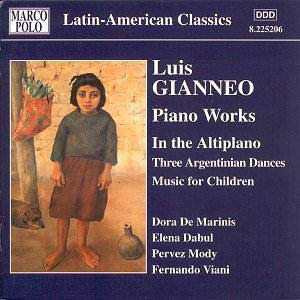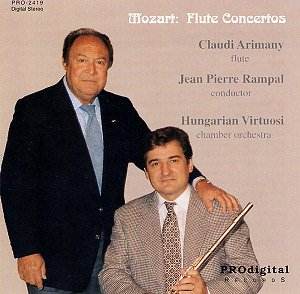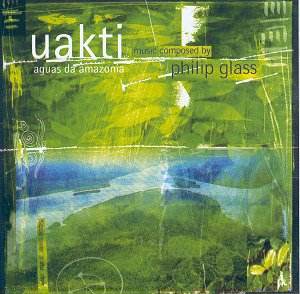 Composer: Luis Gianneo
Composer: Luis Gianneo
Works: Bailecito (1931), Música para Niños (1946), Dos Estudios (1933), Cinco Pequeñas Piezas (1938), En el Altiplano (1932), Siete Piezas Infantiles (1946), Tres Danzas Argentinas (1938), Villancico (1946), Caminito de Belén (1947)
Performers: Dora Di Marinis (piano), Elena Dabul (piano), Pervez Mody (piano), Fernando Viani (piano)
Recording: Schloss Gottesauer, Velte Saal, Karlsruhe, August 2000
Label: Marco Polo
Luis Gianneo, a pivotal figure in Argentine classical music, has long remained in the shadows cast by his more prominent contemporaries. With this recording, we delve into a selection of his piano works that span from 1931 to 1947, a period that encapsulates his Neo-classical style. This volume, the second in a series from Marco Polo, serves as an essential introduction to Gianneo’s oeuvre, offering a blend of folk-inspired melodies and a structured compositional approach that mirrors the development of Latin American classical music.
The recording opens with “Bailecito,” a charming piece that sets the tone for the collection. Its playful rhythms and melodic simplicity invite listeners into the world of Gianneo’s musical language, rich with folk elements yet grounded in classical form. The performers—Di Marinis, Dabul, Mody, and Viani—approach the work with an affable lightness, allowing the rhythmic buoyancy to shine through. One can hear echoes of Ginastera in the “Tres Danzas Argentinas,” where the lively syncopations and vibrant harmonies evoke a spirited dance. The interpretations here are marked by a keen attention to dynamic contrast, particularly in the second dance, which exhibits a delightful interplay between the performers.
“En el Altiplano,” the most substantial work in this collection, showcases Gianneo’s ability to weave complex textures while maintaining melodic clarity. The performers navigate its intricacies with both finesse and conviction. The piece unfolds with a sense of narrative, utilizing a broader emotional palette that contrasts with the more childlike innocence found in “Música para Niños” and “Siete Piezas Infantiles.” These works, characterized by their straightforward melodic lines and simple harmonic structures, reflect a pedagogical intent, yet the performers infuse them with charm, highlighting their inherent musicality.
The sound quality of this recording is commendable, with a clear and vibrant piano tone that captures the nuances of Gianneo’s writing. The engineering allows for a natural resonance, particularly notable in the quieter passages of “Villancico” and “Caminito de Belén,” where the delicate interplay of voices is rendered with an inviting warmth. The recording environment, the Velte Saal, further enriches the sonic experience, providing an acoustically favorable backdrop that enhances the clarity and presence of the piano.
Comparatively, Gianneo’s works can often be overshadowed by his peers; however, this volume arguably stands as a testament to his unique voice within the Latin American canon. The accessibility of these pieces makes them suitable for a range of listeners, from casual enthusiasts to those seeking a deeper appreciation of the genre. The interpretations here serve the music well, striking a balance between fidelity to the text and expressive freedom.
The cumulative effect of this recording is one of discovery. It invites listeners to explore the playful and poignant facets of Gianneo’s music, revealing a composer who, while perhaps not as widely celebrated as others, deserves recognition for his contributions to the development of Argentine classical music. This collection is a significant addition to the recorded repertoire, providing both an engaging listening experience and a valuable glimpse into the evolution of a distinctive musical voice.



